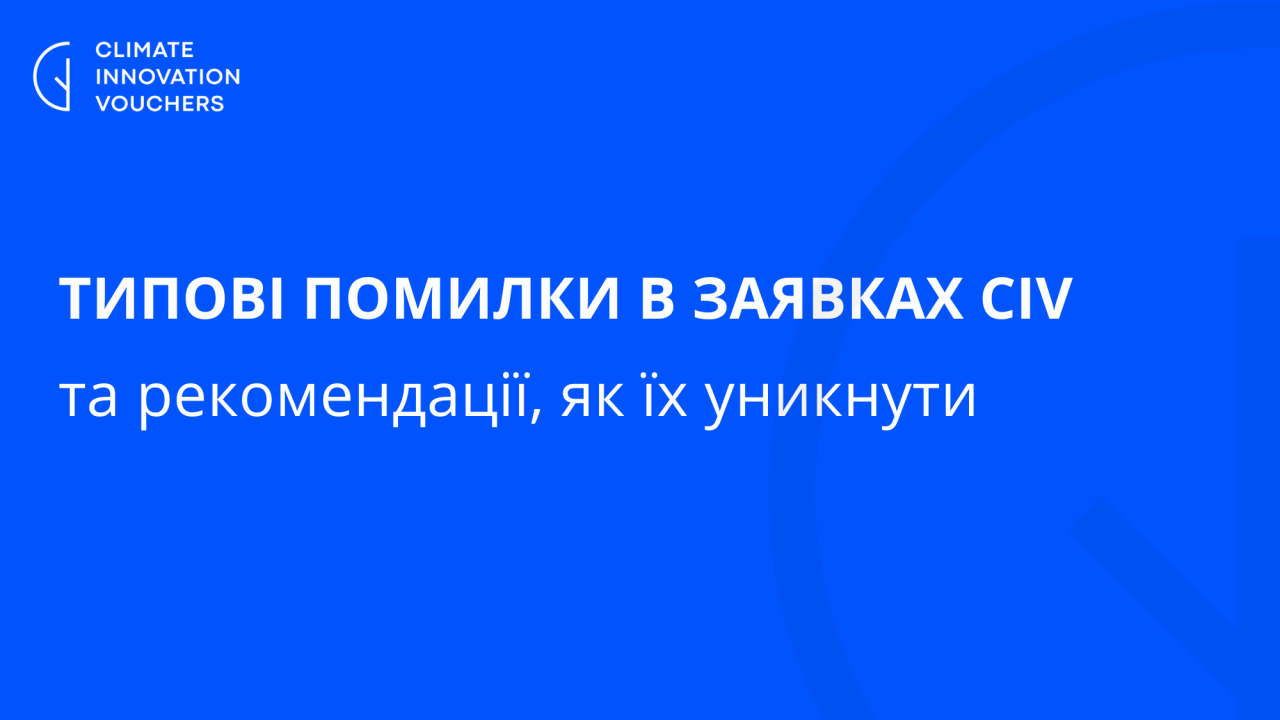The announcement of the winners of the Climate Innovation Voucher competition is very soon, which means that we have reviewed 84 applications and selected the top 14 teams for consideration by the EBRD, as they make the final decision on the future green champions.
This wave of the Climate Innovation Vouchers competition saw a record number of applications. Project manager Olga Zubczyk and co-founder of Greencubator Roman Zinchenko analyzed the application forms and identified typical mistakes made by teams.
We want the next wave to receive even more high-quality applications, and more Ukrainian companies to receive their Voucher, because we love our "green" champions very much. Therefore, during the webinar "Working on errors with CIV applications" we discussed errors, how to avoid them and how to make your application better.
So, typical mistakes and advice on how to solve them.
❌Teams do not read the rules of the competition, so they make mistakes.
Consultation meetings are held before each competition, where the rules of participation, main parameters and selection criteria are discussed. However, every time, for example, FOPs are submitted despite the fact that during the consultation we always emphasize that we cannot support FOPs.
✔️Do not neglect the opportunity to ask questions and chat live. When the team applies for participation in the grant project, it is necessary to learn as much information about it as possible, which will be useful when filling out the application.
❌Applications do not meet the criteria.
✔️Competitive projects are evaluated according to 5 criteria:
Reduction of greenhouse gas emissions, level of innovation, scalability and use in other sectors, market potential.
In order for the jury to rate the application as high as 5 out of 5, the teams must disclose as much as possible the points on which the project is evaluated. It is desirable that this is confirmed with real figures, as well as links where the company took these confirmations.
❌The work with the service provider was done poorly.
It immediately arouses distrust when a complex multi-stage project, in which the applicant described how difficult the project implementation is planned, submits a commercial proposal for 2 lines with one number.
✔️As a rule, teams that have a clear understanding of their market, models of interaction with the service provider, and clarity of cooperation with them gain good ratings.
A good application shows which companies have done quality homework with service providers.
❌Lack of clear calculations.
The expert jury immediately has questions when they see the assessment of emissions "a lot".
✔️A good application contains a "baseline" - what volumes of emissions are generated by this or that type of activity that the applicant improves and the expected effect - how much will be reduced from this "baseline". This is an important component - to show that the team has done some basic analysis in this direction, understood the realities of current technologies and how climate-friendly these technologies can be made. Sometimes it is worth bringing in experts to, for example, qualitatively calculate the climate impact and the reduction of greenhouse gas emissions, if such knowledge is not sufficient in the applicant's team.
❌Companies submit projects to integrate this or that product into their existing business, which are very different from the existing one.
When a company that, for example, deals with computers, declares that it will make helicopters, the question arises as to how its expertise in this production will allow making a completely different technological product. Unfortunately, it happens that people go very far from their area of strength and say that they will make a completely new product in a sector in which they have not worked, and this, as a rule, raises additional questions. This applies to both potential beneficiaries and service provider companies.
✔️ It is valuable for us to understand your business, what you already offer and do. We focus on companies that already have real sales, rather than operating at the start-up level. It does not necessarily have to be global sales, but it is important that it is a sustainable business.
How to choose and work with service providers
Climate Innovation Vouchers is a service program that provides grants to small and medium-sized businesses to pay for services that are necessary for the development or implementation of climate technology. That is, the essence of the project involves the participation of beneficiaries and their service providers, and their "homework" on the project submitted for a grant is very important.
Teams can choose a service provider on our website or find another service provider that must be verified by our team.
We have a simplified service provider verification system. The main requirements are registration for at least two years prior to the submission of the application, a sole proprietorship, an LLC or a state enterprise may apply. A minimum of two testimonials or recommendations for relevant experience must be added.
According to the rules of the project, the service provider cannot be associated with Russia and Belarus, have final beneficiaries from these countries, and also carry out its activities on their territory, on the territory of Crimea and ORDLO. The detection of such factors is a reason for disqualification.
If the applicant chooses a service provider from the catalog on the Climate Innovation Vouchers website, the company must independently ensure that it is able to complete the project on time and within the budget provided for in the project, and will not bear the risks according to the rules of the Climate Innovation Vouchers.
It is important that the team conducts thorough work with the service provider, because the implementation of the project and the receipt of the grant depend on this.
So, taking into account the recommendations, we can conclude that it is not only necessary not to make mistakes, but it is important to make a bright and correct application that will convince all the experts who vote for it that it will be an interesting project.
The key principle for us in the selection is to find champions who understand their market well, understand its pain points well. They already have a certain authority and a certain position in this market and clearly explain how the climate technology they will improve will change the existing situation in numbers, proving what a positive effect it will have.
We hope that potential participants of the next wave will heed the recommendations and will not make typical mistakes in their applications.
You can find out more about the rules here.
We will announce the start of the next wave on our website and at page Climate Innovation Vouchers on Facebook





